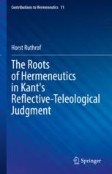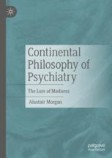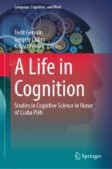Search
Search Results
-
The epistemic harms of empathy in phenomenological psychopathology
Jaspers identifies empathic understanding as an essential tool for gras** not the mere psychic content of the condition at hand, but the lived...
-
Husserl’s Lifeworld and the Scientific Image
In this part of the book, I put Sellars into conversation with phenomenology. It is argued that Husserl’s ‘lifeworld’ amounts to a very detailed and...
-
Heidegger Without Limits
The notion of concealment or lethe stands at the heart of Heidegger’s later philosophy. The figure of a dark ground that holds sway at the center of...
-

-
Anesthesia of Soul by Spirit
The partiality of our ‘to be’ does not know itself as such. At first, the sensitive perception that I have of myself can be lived as neuter and be...
-
Ulrike Kistner and Philippe Van Haute: Violence, Slavery and Freedom between Hegel and Fanon, Johannesburg: Wits University Press, 2020, 168 pp., ISBN 978-1-77,614-623-9, ISBN 978-1-77,614-627-7
Violence, Slavery and Freedom between Hegel and Fanon is a volume of secondary literature that dispels common misconceptions about the relationship...
-
From Johann to Maurice: Science and Expression in the Philosophical Praxis of Medicine
Phenomenology’s return to lived experience and “to the things themselves” is often contrasted with the synthesized perspective of science and its...
-
Ricoeur: Hermeneutics of Self-Recognition
The chapter identifies self-recognition as a leading insight amongst Ricoeur’s ideas on hermeneutics, a commitment however which, the chapter argues,...
-
A Germinal Anti-Psychiatry: R.D. Laing’s Wild Empathy
In this chapter I analyse R.D. Laing’s contestation of psychiatry which moves beyond the institution but places both madness and understanding at the...
-
The phenomenology of joint agency: the implicit structures of the shared life-world
We do lots of things together in a shared manner. From the phenomenological point of view, does joint or shared agency need a conscious sense of...
-
Demystifying mind-independence
Both John Campbell and Quassim Cassam have argued that we perceptually experience objects as mind-independent (MI), purportedly solving a problem...
-
The Tragedy of Scientific Culture: Husserl on Inauthentic Habits, Technisation and Mechanisation
Habit and habitualisation play an important role in Husserl's phenomenology, yet one aspect of habituality has been somewhat overlooked, namely the...
-
An Ontology of the Living
We lack an ontology of our living being—in a way a fleshly ontology which can result neither from a merely mental construction nor from an...
-
Adorno’s Ideas on Stravinsky’s Neoclassicism Meet the Pianist’s Work: Reflecting Playing Experience with Adorno’s Key Concepts
Theodor W. Adorno’s ideas on jazz and Igor Stravinsky’s neoclassicism (1936; 1949; 1963) are notorious for their strident criticism, pathologizing...
-
Social Cognition and Autism Spectrum Disorders: From Mindreading to Narratives
In this chapter I will work on the crucial role of semiotic narratives for social cognition. I will try to stress the key position that a semiotic...
-
“Is” and “Ought” Reconciled
The “is-ought”—conclusion is—according to David Hume—forbidden. But the is-ought-question rises at each moment when thinking is transferred into...
-
Thin or Thick, Real or Ideal: How Thinking Through Fatness Can Help Us See the Dangers of Idealized Conceptions of Patients, Providers, Health, and Disease
The fundamental standard of health care is health. Theories of health affect how we conceive of good health, ill health (and thus disease), Good...
-
Preschoolers’ Sensitivity to the Infringement of Conversational Maxims in View of Mentalization
The present chapter aims to clarify the existing associations between social cognitive skills and a productive pragmatic competence enabling the...
-
Intercorporeality online: anchoring in sound
Ambiguity in our experience of embodiment online has prevented us from confidently extending existing scholarship to the domain of online sociality....

-
Situated and Ethically Sensitive Interviewing: Critical Phenomenology in the Context of Neurotechnology
Phenomenological interview methods (PIMs) have become important tools for investigating subjective, first-person accounts of the novel experiences of...
